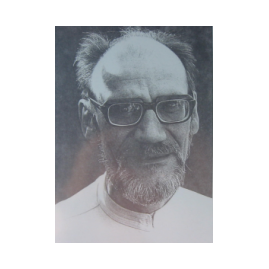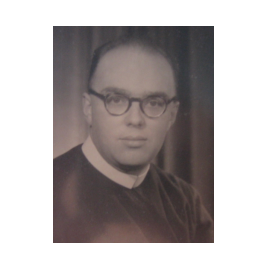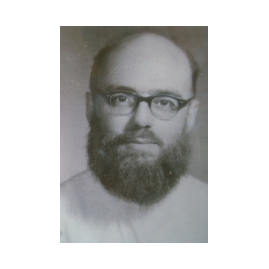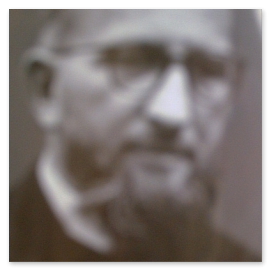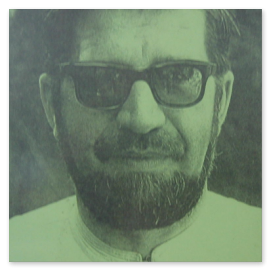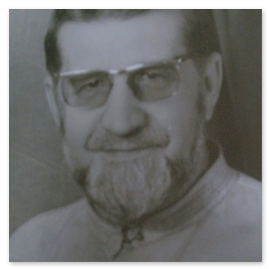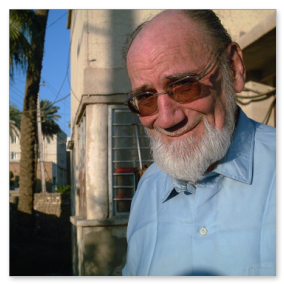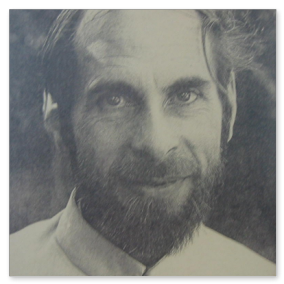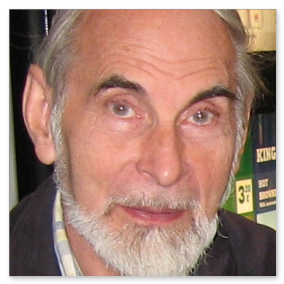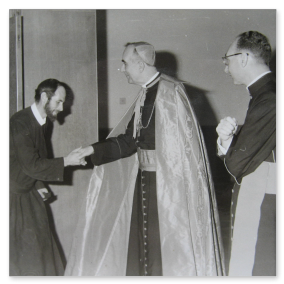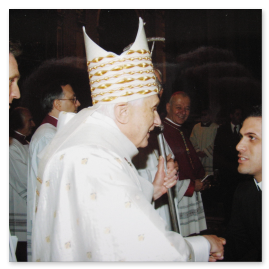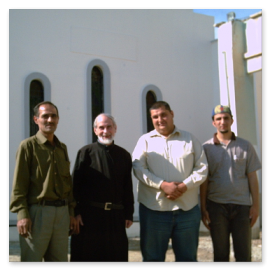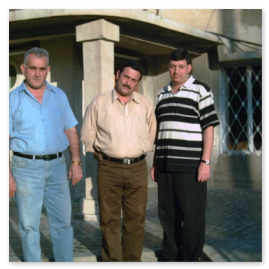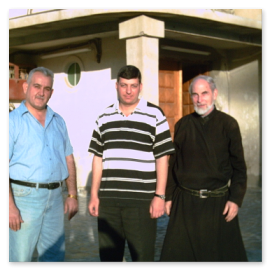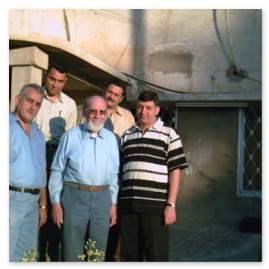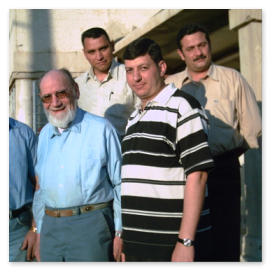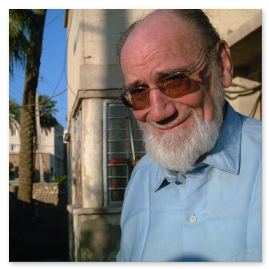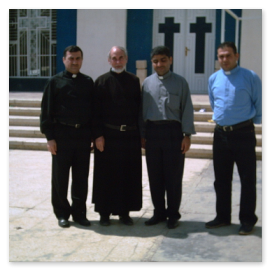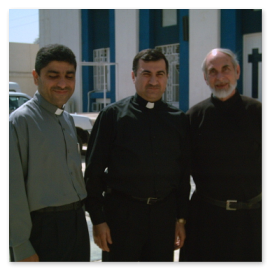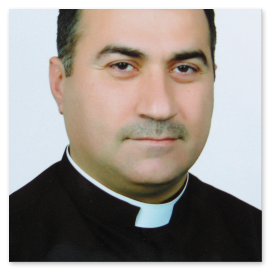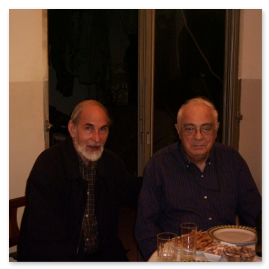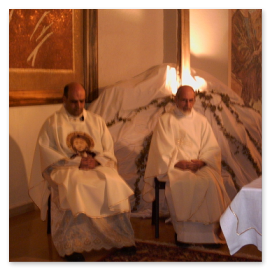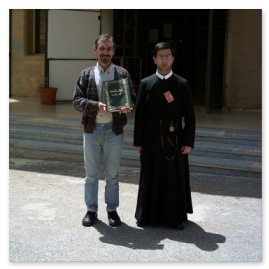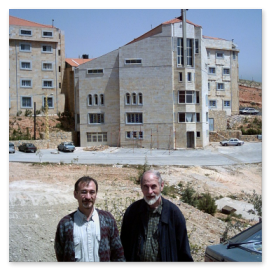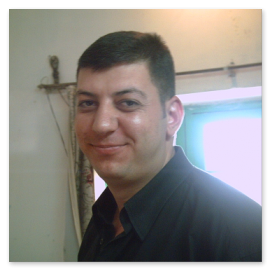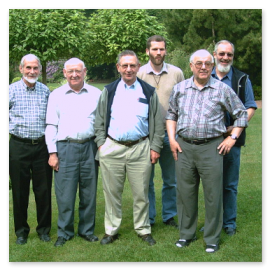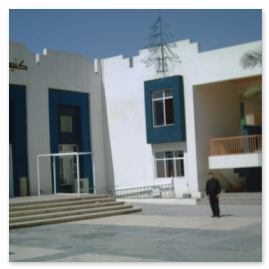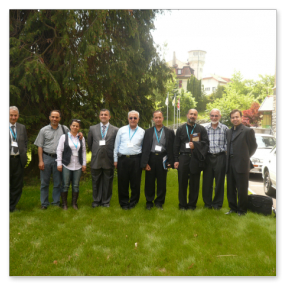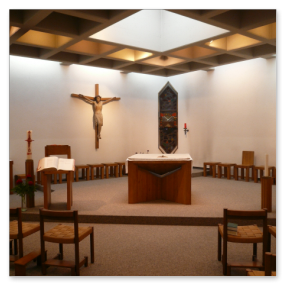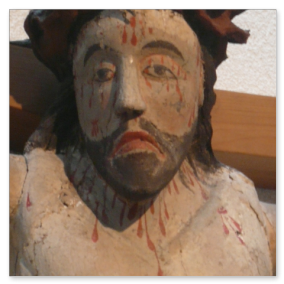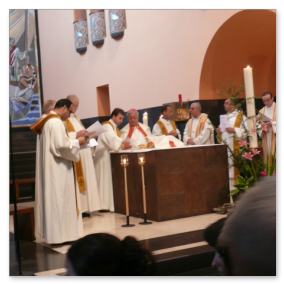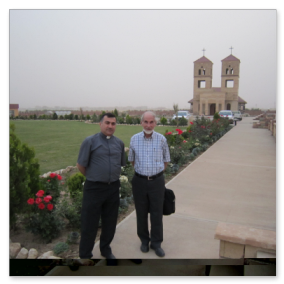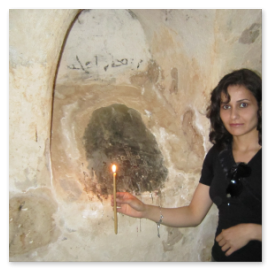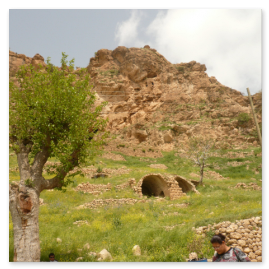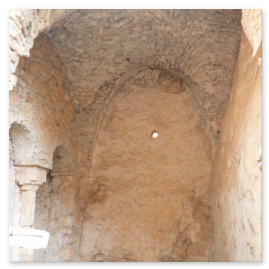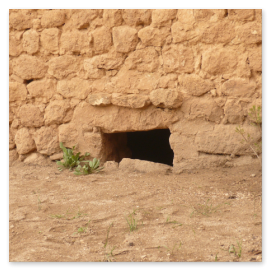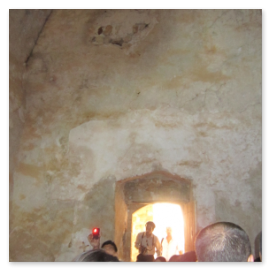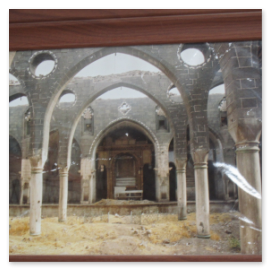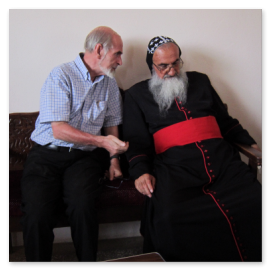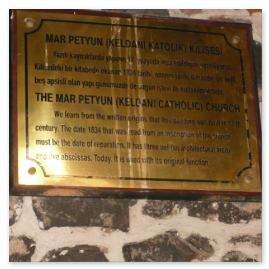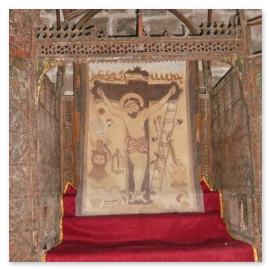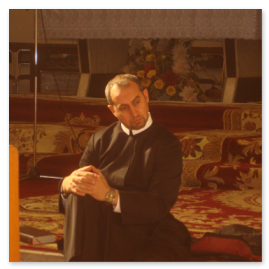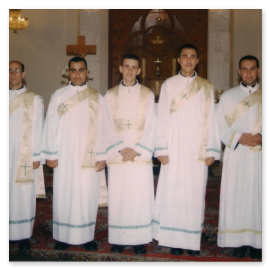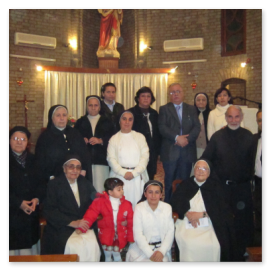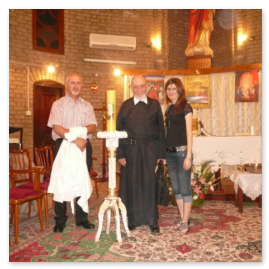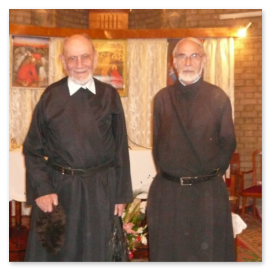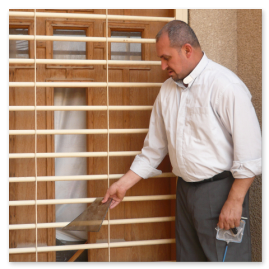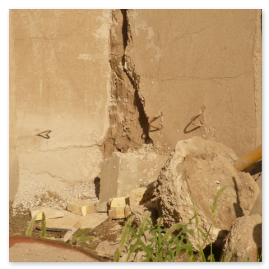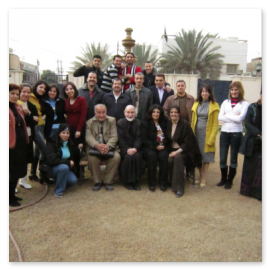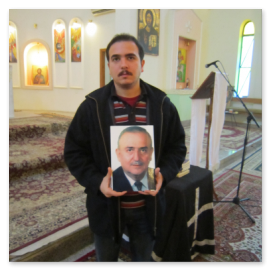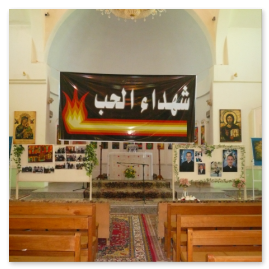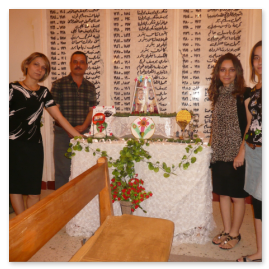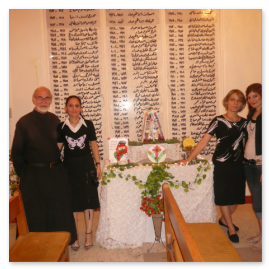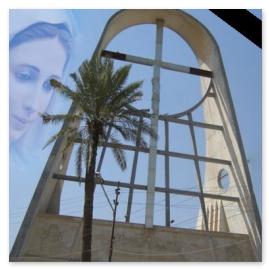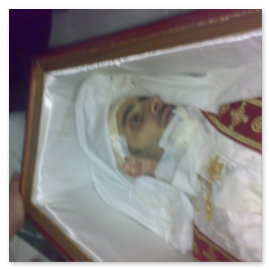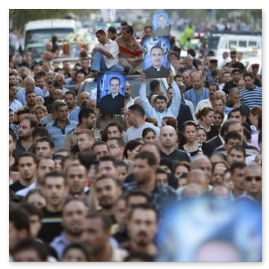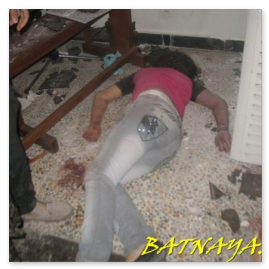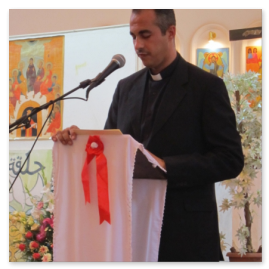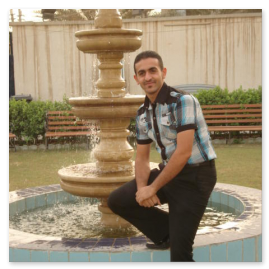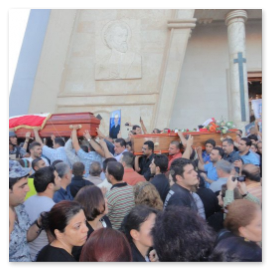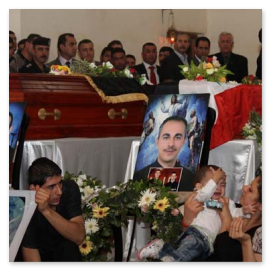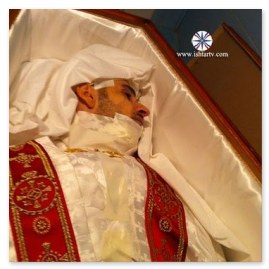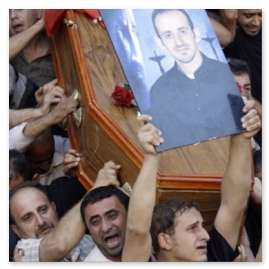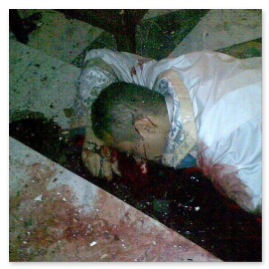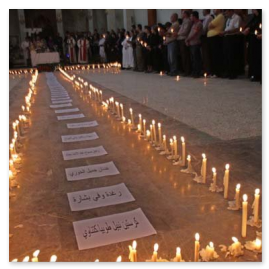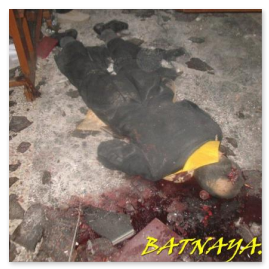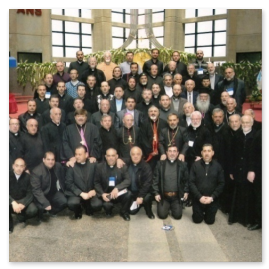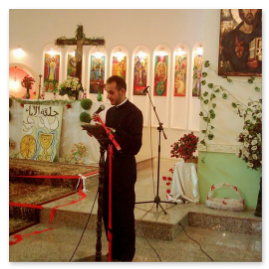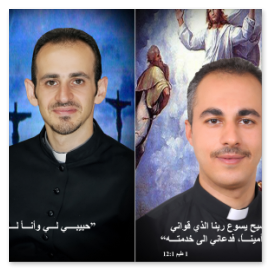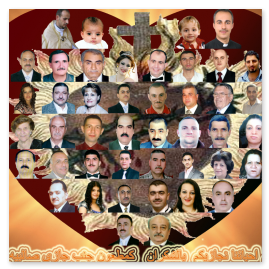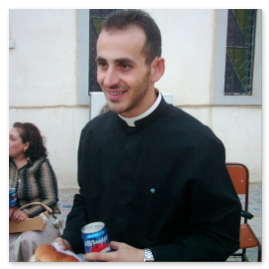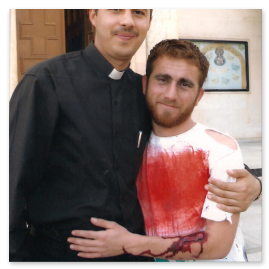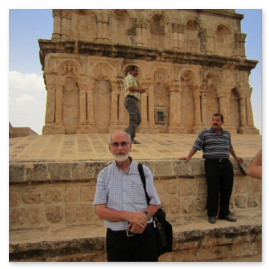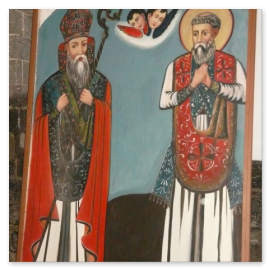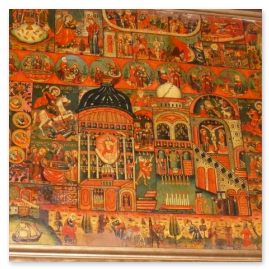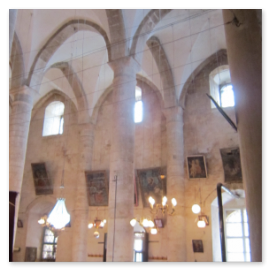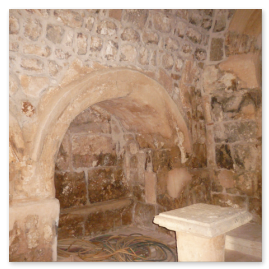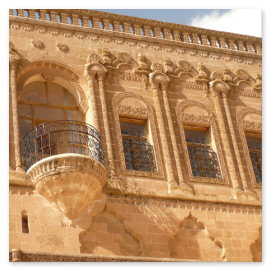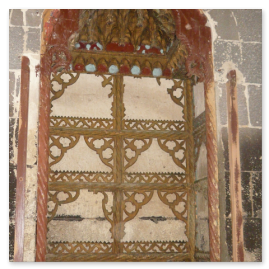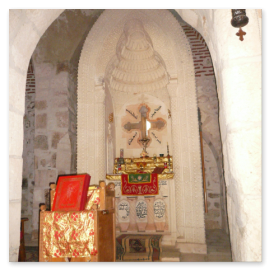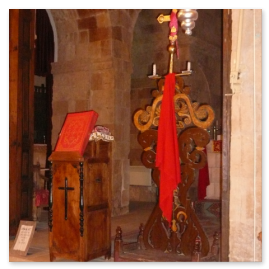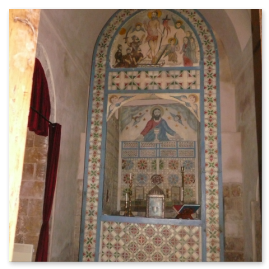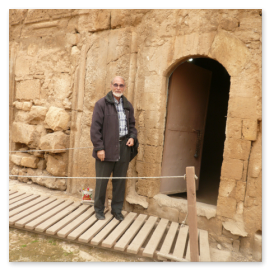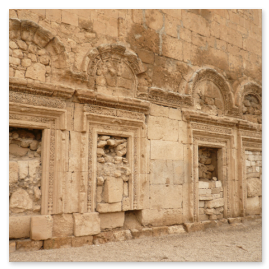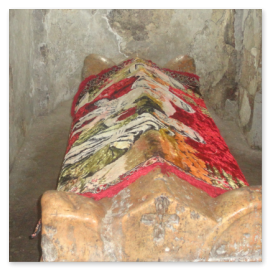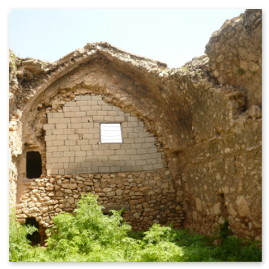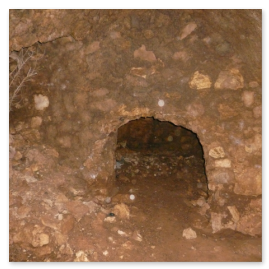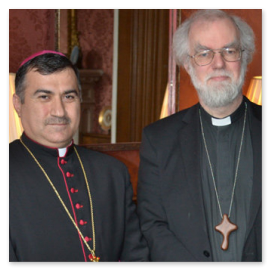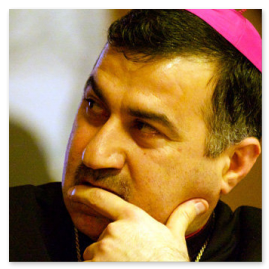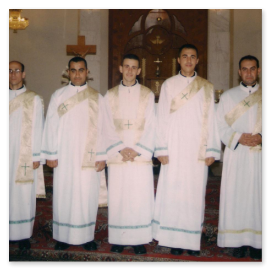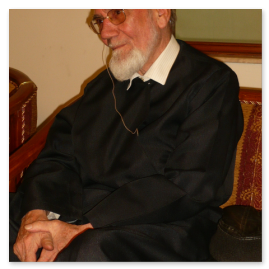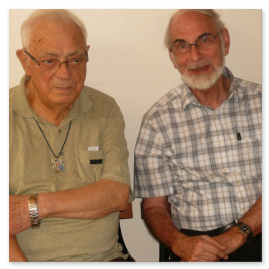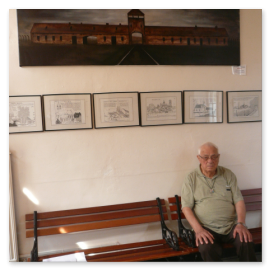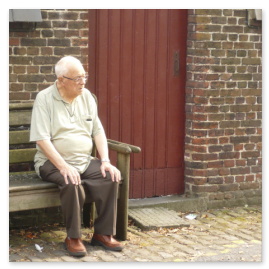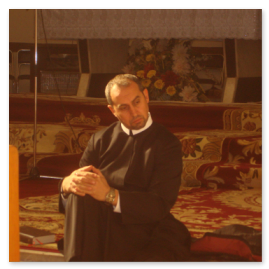The REDEMPTORISTS' MISSION in BAGHDAD -A
HISTORY A1
1. Short history of the Mission. (Under revision)
1.01: A house in the desert (1959 - 71)
St.Alphonse (1696-1787), founder of the congregation of the Redemptorists, had a dream during his life time, to send some of his disciples, on mission to the Church of the East, the so-called Nestorians. At that time it couldn’t be realised, but about 200 years later something of his dream came through.
Around the year 1952 Cardinal Eugene Tisserand, head of the Congregation of the Oriental Churches, solicited the Redemptorist Fathers to start a mission among the Assyrians (The Christians of the Syriac Church of the East are known under different names, previously called Nestorians, since the end of the XVIIIth c. they call themselves Assyrians, and in the West they are known as the East-Syriac Orthodox Church). The Redemptorist Generalate accepted, in the name of the Belgian Province. Two Flemish fathers were send to Paris, and later to Lebanon to learn arabic (1953-55), in preparation for their mission, Fr. Maurice Demarey (1900-1074) and Fr.Jan Praats (1929-1970), who had been a teacher of history in the college of Essen (1951).
Under the protection of the local Chaldean Bishop, they travelled to East Syria, and started working there (Tell Arbosh) among the Assyrians who lived there, since they were driven out of Irak in the thirties. They were able to build a school, but for some unclear political reasons, they had to leave the country (1955), and settled finally in Lebanon, Beyrouth, in an Assyrian quarter of the city (Sid el-Boushriye, Jedeydet el-Metn). With the time passing, they constructed a church and a school for the poor people of the Assyrian community. Several other fathers and brothers joined the mission. Fr.Maurice Bloemen became the director of the school, and Fr.Timon de Cock visited abandoned Maronite villages. Much later, an Antonin-Maronite monk, Elie Sader, who had joined the congregation, build a huge complex 5 stores high, in the neighbourhood of Zahle, as a centre for retreats and spiritual revival.
Meanwhile, in 1958, the new Chaldean Patriarch Paul III Cheikho, previously Bishop of Aqra, where Fr.M.Bloemen had studied Soereth, invited the Fathers officially, to come to Irak, and teach in his seminary, that was to be transferred from Mosul in the North, to Baghdad, the capital (1960). Fr.Jan Praats was the first to come. He spoke fluently Arabic and Soereth, the spoken language of the Chaldeans. Somewhat later he was joined by Fr.Lucien Cop, who had completed two years Arabic in Bikfaya, Lebanon. The beginnings were very difficult, because the fathers were housed badly, in the so-called Chaldean Patriarchate, with hardly a decent room. While they prepared their courses for the seminarians, a Chaldean priest Fr.Emmanuel Delly, later to become bishop and patriarch, taught the Chaldean liturgy, and Fr.Praats started translating The Law of Christ into Arabic. Every day Fr.Cop had to walk 5 km to reach the Chaldean church for the liturgy. When the Patriarch received a plot of land from the government, in a suburb of Baghdad, called Daura, the seminary and an orphanage, were constructed there, under the supervision of Fr.Praats. At 500 m. distance from that complex, he build a church and a house for the Redemptorists. But these buildings lay far away in a desert place (el-Mekaniek), at about 5 km distance from Daura. Sometimes during the winter period the whole region was floated, while in the summer, as water and electricity were lacking, life was unbearable. Every day, Fr.Praats went to Daura to bring bread and foodstuff to the seminarians. Once, when the area was inundated, he had to bear it all on his back, making his way through the mud. Unfortunately, because of a misunderstanding with the superior of the seminary, he was obliged to leave the country in 1965. For a short period, Fr.Cop, teacher of exegesis, was left alone. Fr.Praats continued his mission in Lebanon, where he became superior and was rewarded with the title of archdeacon in the Chaldean Rite, by Patriarch Bidawid. He died in a tragic accident on the road to Damascus in 1970. He is buried in the Chaldean cathedral of Beyrouth (cfr.G+L 1971,16-22).
HISTORY A2
1.02: A hired house in Baghdad (1970 - 1991)
Fr. Maurice Demarey may be considered as the founder of the mission. He had been rector and director of the Redemptorist college in Essen (1942-1947), prefect of the students and novice-master for the brothers in Beauplateau, and provincial (1961-1964). When the congregation accepted the invitation of Cardinal Tisserand, he was asked by the provincial Fr. G.De Ceuninck to take responsibility of this mission among the ‘Nestorians’. After his preparation in Paris, he went to Syria, and back in Lebanon, he acquired the needed funds to build a school with a church in the district of the Assyrians, and bought a precious plot of land for a future convent. He attracted the needed fathers (Fr.Bloemen, Fr.T.DeCock, ao.) as well as brothers (Br.Gustave and Br.Christian) for the mission, and defended its rights, against the distrusting provincial.
Twice he was knocked down by a heart attack (around 1962), but even so, after he recovered partially, he was courageous enough, to return to the mission, as an old sick man, to live there in the desert in difficult conditions. In 1965 he had arrived there in Daura, accompanied by Fr.Vincent van Vossel. Beside his engagements in the Oriental churches, he concentrated his lasts efforts on the French community that gathered every week in the sisters’convent at Bab esh-sharqi on the border of the Tigris. During these years, the apostolic nuncio, Mgr.M.Perrin, who was also Latin bishop of Baghdad, engaged him as secretary. In this function he was able to arrange for the Redemptorists that they were officially responsible for the religious care of all the foreigners, in their different languages. For the English and German speaking he attracted Fr.Albert Rutten, old missionary from the West-Indies, and for the French and Italians Fr.Jan Rolies. At a certain moment there were six Redemptorist fathers in Baghdad.
But again a painful misunderstanding happened, this time with the Chaldean Patriarch, who banished the fathers from his churches and from their house, which was build on his ground. The new Latin Bishop, Mgr. Ernest Niyari, Carmelite, took pity of the fathers, and granted them the use of a house that belonged to the Carmelites, on condition that they continued to work for the foreigners, and assist him in the religious care for the Latin community in Baghdad. Fr.Demarey died in the sisters’ hospital in Baghdad, after a short sickness, February 10th 1974, and was buried in their cemetery next to the old cathedral, in the centre of the city.
In 1964 Fr.Francis Van Stappen, arrived in Baghdad, and was engaged as a teacher of Church-History in the seminary of the Chaldeans in Daura. After his ordination, he had been a famous preacher of missions and retreats in Flanders. He was a very popular and social person, loved by the students and the people. He became superior of the mission, and also secretary of the apostolic nuncio, Mgr. Jean Rupp. He kept all his records up to date. Since his youth he had been collecting information about movies, and became an expert in cinematography. In connection with a cultural centre in Baghdad, where hundreds of youngsters used to gather, he edited a small magazine to introduce and discuss the movies that weekly were shown in that centre of the Carmelites. After the death of Fr.Demarey, he took over the responsibility for the mission, esp. during the years when the fathers were housed in a miserable house that belonged to the Carmelites. But his most famous and lasting activity was concentrated on catechism. He founded a league for the teachers, and he himself used to prepare the teachers every week, with conferences and practical exercises. He wrote more than 15 books in this field. Here are some of the titles: Explanation of the Gospel of Mathieu(1976), The Gospel of Luke(1980), The Acts of the Apostles(1982), 6 books about the Old Testament(1979), Explanation of the Lord’s Prayer(1984), The miracles, The Apostles, Explanation of the Creed(1977), Our Lady in the churches of Baghdad(1985), and also: The Vatican with an History of the Apostolic Nuntiature in Irak(1974), The History of the Redemptorists(1984) and a History of Spirituality. For the students of the seminary he wrote a church history in 5 volumes, and prepared a study on Mariology and on the church-missions. As he was going to move the community into the buildings of the Chaldean cathedral of Baghdad, he suddenly died, one morning when he was preparing to go and celebrate the H.Mass for the Chaldean sisters in Zafaraniya, November 6th 1991. He was buried with great solemnity at the side of Fr. Demarey (cfr.G+L 1985,21;1992,62).
HISTORY A3
1.03: New Redemptorist houses in Baghdad (1991 - 2007)
Fr.Lucien Cop, born in Beveren, Belgium in 1929, ordained priest in 1956. After his seminary studies in Leuven, he was appointed for the mission in Iraq. By ship he went to Lebanon, where he studied Arabic in Bikfaya for two years (1958-59), before arriving in Iraq. At that moment, the Chaldean seminary had just been moved from Mosul to Baghdad. There he had to wait for the accomplishment of the seminary building in Daura, a suburb at some 20 km from the centre. Together with Fr.Jan Praats he spend some time in difficult conditions, in the primitive patriarchate buildings in the city, before moving to Daura, where, meanwhile, Fr.Praats had build a house for the Redemptorists. During that period Fr.Cop had already started preparing his lessons for the seminarians. From then on, during more than 45 years he was the only and great teacher of exegesis, Old and New Testament, a course lasting four years, with an introduction to the History of the People and Hebrew language. First in the context of the Chaldean seminary, and later at the Babylon faculty for Philosophy and Theology. He had an immense influence upon all the priests and students, who he could inspire by his lessons, conferences and spiritual guidance. He intends to publish his studies in Arabic, in a ten volume edition. The three first volumes came out in a provisory print. He also translated several famous exegetical works, like Krauss: The Psalms (2 vols), G.Lohfink: Does God need the Church? And other important books and articles. Next to his exegetical teachings, he is engaged in pastoral work and an appreciated preacher of retreats and conferences for priests and nuns. In 1968 he entered the order of the Chaldean monks of St.Hormizd, but returned to the Redemptorists after a good year on prove. Then he studied exegesis at the university of Leuven, and when he returned to Iraq, taught his subject for two years at the seminary of St.John, belonging to the Dominicans in Mosul. Then he returned to Baghdad where he settled, till in 2007, he was asked to come to Erbil to present his courses there, where the faculty had been transferred.
Fr.Vincent van Vossel, born in Antwerpen in 1935, and ordained priest in 1960. He studied three years in Rome (PIO) before arriving in Iraq in 1965, accompanied by Fr.M.Demarey. For a short period he studied Arabic in Baghdad with the Jesuit fathers, and in Bikfaya, Lebanon. During the sixties he was engaged in pastoral work in Daura, and started teaching patristics at the Chaldean seminary. During the years 1969-70 he was asked to teach exegesis of the New Testament in Mosul, at the Dominican seminary of St.John. When he returned to Baghdad he was appointed responsible for the pastoral care of the foreigners (English, French, German, Italian) with huge groups of Philippinos and Indians, Koreans and Polish. For each group, there were masses, catechism and sacraments. Besides he helped in Chaldean parishes. Meanwhile he started again teaching patristics in the seminary. When the Babel college for Philosophy and Theology was founded in 1979, the seminarians had to complete their studies there, but the faculty was open for all denominations, religious as well as laity. The most regretted Dean of the faculty, Fr.Joseph Habbi, asked gradually Fr.Vincent to teach many subjects next to patristics, Syriac, Greek and Latin, Modern Theology and Christology, Chritian Art and Iconography, then Oriental Liturgy. He also had to replace Fr.Francis who had taught Church History and the History of the monastic movement, Eastern and Western. Most of these subjects were elaborated into books and published in Arabic: The Gospel of Marc in Aramaic (1983), The Twelve feast (1984,1998), The Church through History (1997), God in Modern Thought (2002), Modern Christology (2004), St.Ephrem the Deacon (2003), The History of the Monastic Movement (2005), Theodorus of Mopsuestia (2004), Eastern Anaphora (2005), Eastern Baptismal Liturgy (2006), The Chaldean Prayer of the Hours I-III (2006-7), The School of Antioch (2007), The Sacraments in the Eastern Liturgies, History and Theology (2007). He participated several times with a paper, in the Syriac Colloquia in Lebanon, organized and published by the CERO.
Since 1995 he is patriarchal vicar, responsible for the Greek Catholic (Melkite) community in Baghdad and rebuild their destroyed church (2003). Like Fr.Cop he now has to travel to Erbil, from time to other, to deliver his courses there, but without abandoning his pastoral work in Baghdad.
HISTORY A4
The two remaining fathers (L.Cop & VvV) refused to serve the cathedral in order to concentrate on their teaching in the seminary. During 5 years, thanks to the assistance of the Flemish Province, they could leave the rented house and obtain two houses in Baghdad and one in Daura. Around 1994 Rev.Fr.General Juan Lasso de la Vega visited Baghdad. He decided that the mission should go on, and candidates accepted. The same day Fr.Bashar joined us. He became the first Iraqi Chaldean priest who joined the Redemptorists. In 2007 we had three solemnly professed, 2 temporarily, and two candidates students. One candidate was transferred to the Canadian province, and another to the Lebanese. We also lost two brilliant candidates who had accomplished their noviciate in Ireland. (On the pictures: Samim Balios greeting Pope Benedict XVI, Meayssir Behnam, Mehel Kamil, Tha'ir Jauwhar, Karlo.
HISTORY A5 - A6
Fr.Bashar Warda, a young Chaldean priest from the Zakho region, joined the congregation, after a visit of Most Reverend Father General to Irak (1994), when he decided that the mission should go on. Fr.Bashar made his noviciate in Dundalk, Ireland, and studied at the university of Leuven (Flanders) where he obtained a licentiate in Morals with a thesis on Violence in Islam. He came back to Irak in the year 1998, where he was appointed (since 2001) as teacher of fundamental ethics, social doctrine of the church and pastoral morals in the college. At the same time he worked in several parishes till he was appointed parish priest in an important parish called Mar Eliah. As responsible for the cultural activities of the college, and the formation of catechists, he also managed to rebuild the library of the college and several rooms and the cafeteria. In six churches he arranged a center for computers, equipped with buses to bring the students and provided 38 generators for the churches. He constructed further an orphanage and a building for the church tribunal and three primary schools. He also repaired the Redemptorist house in Daura and constructed a new one in the village of Alqosh. At this moment he is responsible for the formation of the seminarians in the North, where he continues his teachings and the construction of the college buildings and the seminary.
History of the Mission in Baghdad
2.01: The Beginnings (1959 - 1971)
The mission was accepted under the provincialate of Gustave De Ceuninck (1947-1952, 1955-1961) and encouraged by Fr. Maurice Demarey (1961-1964).
After their expulsion from Syria, the new Chaldean Patriarch Paulus III Cheikho (1958-1995?) invite the Redemptorist Fathers to Baghdad, where his seminary, small & great, had been transferred, from Mosul. The seminarians lived at that moment in a provisory place (Sa’adun Park). Fr. Jan Praats came first (1959?) to help building the seminary in Daura, Mekaniek. The construction contained two similar buildings, one being the seminary and the other an orphanage (small seminary). This building was finished around Easter 1961. There were also some Kerala Fathers involved in this project. Fr. Cop came in 1960 (Oct). He lived together with Fr. Praats in one room in the H.Family Parish, Sa’adun Street. Their lodgment was very poor. Fr. Cop had to make a table from wood that had been used as trunks for Fr. Emm.Delly’s books sent from Rome. Fr. Cop had to walk extensively, to celebrate in the church of Sorja, or to give his courses in Sa’adun Park. He had been appointed teacher of H.Scripture, next to Fr.Praats, who taught morals (The Law of Christ). Around Easter 1961, the seminary building was completed, and also the house for the Redemptorist Father in that neighborhood was finishing, and the two fathers left for this new residence, in a place called “el-Mekanik”, close to Daura, some 20 km. from the center of Baghdad.
There, the government had given a large plot of ground to the Chaldean Patriarch, so that a Chaldean village could be constructed on it. The ground being divided up into parcels could be bought by the Christians. In order to attract them, the Patriarch, assisted by Fr.Praats, fixed there his seminary and orphanage. About one km. further, a church was build, and a parcel given to the Fathers to construct their own house. The construction of the house was fully paid by the Fathers. The other parcels were sold, but only 3 – 4 families actually came and build their houses there. Next to the residence, a church was build by Fr. Praats, with a “yezidiya” dome, which later on had to be remade by order of the Patriarch. Two years later, also the monks of St. Hormizd build a poor monastery in that neighborhood. Life was very primitive, no electricity and no water, practically in the midst of the desert, sleeping on the roof during the long unbearable summer, fighting against the mosquitoes.
Every day Fr. Cop went to the Seminary for his lessons. Fr.Praats with his car was like a secretary to the Patriarch, and helped in the seminary with all kinds of jobs. In the winter, when everything was flooded, he went walking to the village, some 7 km further, to bye bread for the seminarians, bearing the big sack on his shoulders. However, one day he got himself in trouble with the Chaldean rector of the seminary. As a result Fr. Praats was expulsed from the country (1964?). Official records of this event were found, after the fall of the Sadam regime (2002). During this period, in 1964, Fr. Francis Van Stappen, had joined the Mission. He could drive a car, and was appointed teacher of Church History. In 1965 (Oct.) arrived Fr. Maurits Demarey and Fr. Vincent van Vossel. Later on, for some months only, they were joined by a student who was interested in the Mission, Jan Van Bellingen. The Fathers had to study the Arabic language, and at the same time prepare their courses for the seminary. Besides this, they also were involved in parish work in Daura or Baghdad churches. Fr. Francis was very productive. He composed a Church History in 5 volumes, uncompleted. He engaged in the Center of the Carmelites, where he became supervisor of the weekly film presentation, a matter he loved since boyhood. He issued a magazine about movies in general and the weekly films in particular. He collected an extraordinary documentation on movies, still kept until today.
HISTORY A7
2.02: Saint Clement Province and the Mission (2005 - 2008) 25/09/08
At this moment we are Sept.2008, and some important events of the last years might be recorded.
Since we obtained our own house in Baghdad (Hay Babel), thanks to Provincial Fr. Paul De Smijter (1979-1995), and during the first period of Fr. Walter Corneillie (1995-2003), some youngsters joined the congregation:
Fr.Bashar Warda, a recently ordained Chaldean priest, was accepted by Fr.Juan de Lasso, on his visit to Baghdad in 1995. Fr. Bashar left for his noviciate in Ireland, Dundalk, and studied two years in Leuven, where he obtained his licensee with a work on “Violence in Islam”. In 1998 he came back to Baghdad, and lived in the house of his parents in Daura, close to the seminary and the Faculty of Philosophy and Theology, erected by Fr. Yousif Habbi, where Fr. Bashar started teaching, and after the passing away of Fr.Habbi, due to an accident in 2000, Fr. Bashar played an important role in the direction of the faculty, arranging a chapel, a library and a diner room. At the same time he was appointed parish priest of Mar Eliah church, where he successfully arranged the church building, and opened a school. In 2006 when the faculty was transferred to Erbil, Ainkawa, he became the director of that project, materially and spiritually building the seminary and faculty in an unprecedented way. He is there respected and loved by everyone.
Sinds the creation of the St. Clements Province all our candidates left, because of some misunderstandings.
HISTORY A8
2.03: The Candidates (2008)
Only Meyassir, completed his studies according to our plans, and is now decided to return to Iraq and help us in the mission work. He already was ordained priest, by the Syrian Bishop Mar Basilius, in his own village, in the presence of his parents and friends, during the Christmas days 2007.
Meanwhile Fr.Bashar has built a retreat house in Alqosh, and at the same time, he organizes the Chaldean seminary and the Faculty for Philosophy and Theology in Ainkawa. There also he constructs the new buildings for the Patriarchate, the seminary and a sisters’ convent. During the summer he made a journey with the students to Rome, and other European countries. During that year Fr.Bashar published two books, a meditation book and one about morals.
In Baghdad, as usual, the students of the Circle for Patristics celebrated the end of the year, in the presence of Mgr. Shleymoun Wardouni (June 2008). Fr.L.Cop completed the Arabic translation of two famous books: Lohfink’s: “Does God need the Church?” and Bodifee’s: “God en het Gesteente”. V.v.Vossel wrote a long article in French about the “Nestorian Mystics”, and a book “The School of Alexandria”. They plan to start a new project: Center for Eastern Studies, which contains two branches, the Institute for Theology and Philosophy, the lessons taking place in the morning (during 4 years) and the Faculty for Eastern Studies in the afternoon. The courses hopefully will start in Oct.next..
HISTORY A9
Missio – Baghdad 2010 – 2012
These last years were of some importance for the Missio – Baghdad. In spite of the great losses, since we were attached to the Clemens Province, our Redemptorist’ work in Baghdad continued, first with only two persons, then three and now five. Father Luc Cop and myself take care of the work in Baghdad, the masses and teachings, and from time to time one of us, alternatively, travel to the North, to Ainkawa – Erbil, to give our courses, Fr. Cop exegesis Old- and New Testament, and myself: Church history, Patristics, Eastern- and modern theology. Fr. Meyassir Behnam, after completing his studies in Rome (3 years) came back and joined us, first in the Greek Catholic church till he was appointed by the Chaldean Patriarch, as parish priest of the important Sacred Heart church in Baghdad. He works there as a fervent priest with plenty initiatives. He was nominated there as director of the Catechetical Institute for formation of the catechists. Meanwhile he travels to the North for courses and conferences, and even to Sweden, where he gives recollection sessions for the Iraqi youth. In 2011 an important colloquium was held in Fribourg (Swiss)with the participation of the Dominican university and the Babel College from Iraq, represented by the teachers, among them Dr. Hikmet Bashar, an archaeologist and Mme Suha Rassam.
HISTORY A10
Meanwhile in Baghdad, in the compound of the Melkite church, our institute of Patristics, which exists since 1997, has developed into a Center for Eastern Studies, since 2009. Courses are given during 5 days a week, and from time to time the students make a study trip to archeological sites. Last years they went twice to South Turkey, where they visited the tomb of St. James in Nisibis, the memory of St. Ephrem in Urfa, the convents of Mar Awgin and Abraham on mount Izla, and the churches in Mardin, Madiath, Diyarbakir and Seert. Last year there were more than 80 inscriptions, till the attack on the church of Our Lady of Deliverance (Oct. 2010), with disastrous consequences: the intensified exodus of the Christians of Baghdad. Our Center lost its director (Fr. Thaer Abdal), a teacher (Fr. Wasim Behnam), two martyr students, and the number dropped to 40. Nevertheless 5 students graduated this year (2011).
During this year (2011) Fr. Mansour took part in a symposium in Fribourg, Swiss, where the university of Friboug welcomed a delegation from the Babel College for Philosophy and Theology of Iraq. The father presented a paper on : “Remnants of Christian Art in Iraq”. A Eucharist celebrated according to the Chaldean rite in one of the Fribourg’ churches came as an impressive conclusion for the symposium. The father used the occasion to visit the neighboring convent of the Redemptorist fathers in Matran, where several statues of father Hugo are kept. He was welcomed by a cousin of the late Fr. Rey Mermet.
HISTORY A11
A Redemptorist, a member of the St.Clemens Province in Baghdad.
As Baghdad was in the news last weeks, because of persecuted Christians, it might interest some confreres to know what is happening to the Redemptorist Fathers in that place. Here follows a description about one of their members and how the events affected him.
During the dark days of murder and attacks on Christians and their churches in Baghdad, some Redemptorists shared the sufferings of their people. Even more than the Italians, the Eastern Christians care for their relatives and keep affective family relations high. They are extremely sensitive for what happens to each member of the clan.
On October 11, 2010, during the evening Mass, when the faithful were gathered in the church of Our Lady of Deliverance, the main church of the Syrian Catholic community in Baghdad, a brutal attack took place, at the very moment of the Eucharist. It is a modern church, constructed by a Polish architect, in the shape of a ship, with an open bow over the entrance, so high that it can be seen from all over the city. The bishop was on vacation and his archdeacon, Mgr. Raphael Qoteymi, was supervising the Mass celebrated by a young priest, Fr. Thaer Abdal. He was assisted by an even younger priest Fr. Wasim. At the moment of the sermon, suddenly the church came under heavy attack, from two sides. From the side a car with explosives, and at the entrance a group of several gunmen destroyed the high wooden doors, and entered the church shooting and crying their frightening religious slogans, and all the people inside bewildered and afraid went down under the benches. The priest who tried to reason them was shot immediately, and fell on the steps of the altar. His friend who wanted to protect him also was killed merciless. The archdeacon with a group of faithful fled into the sacristia and barricaded the door. A row of protesting youngsters was shot and frightened women with children were lying on the floor. A baby boy was shot in front of his mother, before she was killed also. About 50 people were martyred that day and many wounded, by the bullets and explosions.
Most of these Christians come originally from a village in the North, in the neighborhood of Mosul. It is the most famous Syrian Catholic village of the region.
The inhabitants know all each other, as if they belong to the same family. One of the redemptorist fathers, working in Baghdad, belongs to this village. He knew most of the people who were killed that day, besides, Fr. Wasim is his friend and close relative. This Syrian Catholic Redemptorist was ordained in his village on Christmas day some 3 years ago. After completing his higher studies in Rome, he came back and joined the Redemptorists in Baghdad. Because they belong to the Chaldean rite, he had to learn to celebrate in that rite. As the Fathers are taking care of the Melkite (Greek Catholic) community, which is without a priest, he served for a while this abandoned flock. At the demand of the Chaldean Patriarch he was then appointed pastor for an important Chaldean parish (Sacred Heart) in the midst of 2010. With all his energy and inventive Spirit he cared for this neglected church. There also he was appointed director of the Catechetical Institute, where the teachers are educated and prepared for their lessons on Fridays. Besides that, he also teaches in the Redemptorist Center for Eastern Studies in Baghdad and at the Babel College in Erbil. This Redemptorist father was deeply shocked by the murder of his village people, and especially the two young priest who were his close friends, always working together and sustaining each other. Fr. Thaer was the director of the Center for Eastern Studies, and Fr. Wasim used to teach there Church History. Many people from the North came over for the impressive burial through the streets of Baghdad, even the mother of this Redemptorist Father.
But the killing goes on. In the night of 02-01-2011, a girl (48 years old) a teacher at the university, was found in her house, tied up to a chair, slaughtered with a knife on the head, and then covered with a sack. This girl had written poems in remembrance of Fr. Thaer and Fr. Wasim. Her texts were attached at the walls of the ruined church. She also is a close relative of Fr.Wasim and the redemptorist Father from the same village.
A few days later, a member of our Greek Melkite community was murdered. Later he was found in his house, stabbed several times and then “buried” in his refrigerator.
During these horrible days, the Redemptorist Father has suffered and is broken by pain. A word of comfort from his congregation is lacking. No material help or spiritual support. Baghdad is like a forgotten place. However not completely forgotten, because a letter arrived. Unfortunately, not a letter of condolence, but a letter asking for money. In the midst of their suffering the Redemptorists have to repay a debt that was already quitted. But even so they will try to help those poor people out of their misery.
Baghdad 2011-01-05
HISTORY 12
HISTORY A13
Massacre in the Church of Our Lady of Deliverance Baghdad 31/10/2010, with the martyr Fr. Thaer, director of the CES, and the martyr Fr. Wasim, theacher at the CES.
HISTORY A14
Journey to South Turkey: Nisibis - Mardin - Diyarbakir, with the CES, 2010-2011.
HISTORY A15
Bishop Bashar Warda, our other confrere, was first appointed director of the Chaldean seminary and the Babel College for Philosophy and Theology, and therefore had to emigrate to the North, after the Seminary in Daura – Baghdad was closed, because of the dangerous situation. Then in 2010 was elected bishop, and consecrated Archbishop of Erbil. For this occasion the provincial of the CP, H. ten Winkel and his assistant came over to assist at the consecration ceremony. They also visited our house in Alqosh.
Archbishop Bashar is one of the finest bishops in the North of Iraq. He brought new life to a neglected diocese, for many years left without a proper bishop. The administration and the pastoral work are fully taken care of. Every Wednesday he preaches a conference in the main church explaining the Bible. He started great projects, building two new churches, schools and an hospital, and prepares for an university. He gathers his priests every week to study the situation and plan the pastoral work. Thanks to him, there are Redemptorist’ vocations in that area.
HISTORY A16
Fr. Timon De Cock on a visit to “Begijnhof” in Gent, during his vacation September 2012. Just like Fr. Maurits Bloemen he is this year 65 years as redemptorist and 60 years priest. He spend about 58 years in the mission of Lebanon, where he runs a school and the church of Our Lady of perpetual Help (Beyrouth).
The room where Fr. Lucien Cop is housed in “Begijnhof”. In September 2012 he decided not to return to Baghdad, and to remain in Belgium in the compagny of Fr PetitJean and Fr. Pennink en Fr. Ben. Zr. Andrea gives there lessons in icon painting and takes care of the material needs of the fathers.
Fr. Lucien Cop was in the mission of Baghdad for about 52 year, and during that period he used to teach in the seminary of the Chaldeans. Later on this became the Faculty for philosophy and theology, now based in Ainkawa, Erbil, Kurdistan. He teaches scripture, old and new. He had great influence upon the students and those who came to listen to his talks about the bible, according to the Louvain interpretation. Some of his courses were edited in book form. He translated articles “Before your face oh Lord”, Baghdad 2006. He translated Lofinck’s book “Does God need the church”? He is still working on the translation of a last book which is an introduction to the litterary reading of the books of the Bible. He was working in Baghdad for long years as a translator and secretary of the papal nuntio. With Christmas and Easter he used to celebrate the masses and preach in the chapel of the sisters of the Presentation of Tours. He was the great man of the Redemptorists, together with his friend and life compagnon, who passed away too early.
Fr. Meyasser Behnam came to Baghdad in 2007 after completing his studies in Rome. For a while he was responsible for the Greek community, then the Chaldean patriarch asked him to run the parish of the Sacred heart in Baghdad. He renewed the parish and attracted people from all sides. He became there director of the catechetical center. He suffered very much when the church of Our Lady of Deliverance was attacked and about 40 people of his village were killed, among them 2 priest, one of them a close friend and family member.
Menhel Kamil, a Catholic Syrian from Mosul, who entered the noviciate in Baghdad, and after three years was ordered to come to Europe, where he spend some time in Italy (Verona), Germany and London. Because of some misunderstanding, with the previous provincial, he left the congregation and remained in Germany for some years, till he decided to come back to the mission in Baghdad in 2010. There he was appointed director of our Center for Eastern Studies and deacon in the melkite church. He is extremely helpful, and assisted Fr. Cop for long days during his operations. With Christmas 2011 he asked the provincial to be reaccepted as Redemptorist. After a long period the answer was that he had to remake his noviciate somewhere in the west, after learning the language. This position was repeated again on a visit in Sept. 2012. Already the year before, and now again, the text of the Directorium Superiorum was shown to the provincial, where it states that he hasn’t to remake his noviciate. The provincial however advised us to become a kind of a diocesan group under one of the local bishops.
